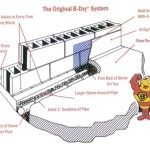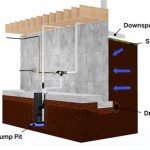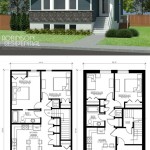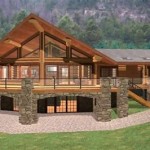One-Story House with Basement for Sale: Examining the Benefits and Considerations
The real estate market constantly presents diverse housing options, each catering to specific needs and preferences. Among these, the one-story house with a basement holds a unique position. This architectural design combines the accessibility of single-level living with the added space and versatility of a subterranean area. The presence of a basement can significantly enhance the functionality and value of a one-story home, making it an appealing choice for a wide range of potential buyers. Consequently, understanding the advantages, drawbacks, and key features to consider when looking at a one-story house with a basement for sale is crucial for making an informed investment.
One of the initial considerations for prospective homeowners is the overall functionality of the property. A single-story house inherently offers ease of movement and accessibility, particularly beneficial for individuals with mobility issues, families with young children, or those planning to age in place. The absence of stairs eliminates a common hazard and simplifies daily routines. However, the addition of a basement introduces a separate living space that can be adapted for various purposes, effectively increasing the livable square footage without expanding the footprint of the house.
The location of the property is also paramount. The suitability of a basement is heavily influenced by the local climate and soil conditions. In regions with cold winters, a basement can provide insulation and help regulate the temperature of the main floor. Conversely, in areas prone to flooding or high water tables, a basement may require significant investment in waterproofing and drainage systems. Therefore, a thorough assessment of the property's location and its potential impact on the basement is essential before committing to a purchase.
Key Point 1: Advantages of a Basement in a One-Story House
A basement in a one-story house offers a multitude of advantages that significantly enhance the property's value and functionality. These advantages stem from the inherent characteristics of a basement, such as its temperature stability, potential for diverse uses, and contribution to overall property value. Understanding these advantages is crucial for prospective buyers contemplating a one-story house with a basement for sale.
One of the primary benefits of a basement is its temperature regulation capabilities. Located below ground level, a basement naturally maintains a more consistent temperature than the above-ground portions of the house. This can translate into lower energy bills, as the basement helps to insulate the house during both summer and winter months. In colder climates, the basement can act as a buffer against the freezing ground, preventing drafts and reducing heat loss. In warmer climates, it can provide a cool retreat during the hottest periods of the year.
The versatility of a basement space is another compelling advantage. Basements are often used for storage, providing ample space for seasonal items, holiday decorations, and other belongings that are not needed on a daily basis. However, the potential uses of a basement extend far beyond simple storage. A finished basement can be transformed into a home theater, a recreation room, a home office, a guest suite, or even an additional living area. The ability to customize the basement to suit specific needs and preferences adds significant value to the property.
Furthermore, a basement can contribute significantly to the overall property value. Even an unfinished basement increases the potential square footage of the house, which is a key factor in determining market value. A finished basement, with proper insulation, flooring, and lighting, can further enhance the property's appeal and command a higher sale price. The extent to which a basement contributes to the overall value depends on various factors, including the quality of the finish, the size of the basement, and the prevailing market conditions.
Beyond the practical and financial benefits, a basement can also provide a sense of security and privacy. Located below ground level, a basement can serve as a safe haven during severe weather events, such as tornadoes or hurricanes. It can also offer a private retreat for family members or guests, away from the main living areas of the house. This sense of security and privacy can be particularly valuable in densely populated areas or in homes with limited outdoor space.
Finally, the presence of a basement can facilitate access to essential utilities. Many homes locate their furnace, water heater, and electrical panel in the basement, providing easy access for maintenance and repairs. This can simplify routine maintenance tasks and potentially reduce the cost of repairs, as technicians can access the utilities without disrupting the main living areas of the house.
Key Point 2: Potential Drawbacks and Considerations
While a basement in a one-story house offers numerous advantages, it is also important to consider the potential drawbacks and challenges associated with this type of construction. These drawbacks can include moisture issues, limited natural light, and potential code compliance challenges. Addressing these issues proactively can help mitigate potential problems and ensure a positive ownership experience.
Moisture is a common concern in basements, as they are located below ground level and susceptible to water intrusion. Poor drainage, inadequate waterproofing, or high water tables can lead to dampness, mold growth, and structural damage. Addressing moisture issues can be costly, requiring professional waterproofing services, sump pump installation, or improved drainage systems. Therefore, a thorough inspection of the basement for signs of moisture is essential before purchasing a one-story house with a basement.
Limited natural light is another potential drawback of basements. Because they are located below ground, basements typically have few or no windows, resulting in a lack of natural light. This can make the space feel dark and claustrophobic, particularly if it is used as a living area. To mitigate this issue, homeowners can install larger windows, add artificial lighting, or consider a walk-out basement design that allows for more natural light and ventilation.
Ceiling height can also be a limiting factor. Older homes may have basements with low ceilings, which can make the space feel cramped and uncomfortable. Building codes typically require a minimum ceiling height for habitable spaces, so it is important to verify that the basement meets these requirements. If the ceiling height is too low, it may be necessary to lower the floor or raise the foundation, which can be costly and disruptive.
Accessibility can also be a concern, particularly for individuals with mobility issues. While a one-story house eliminates the need for stairs on the main floor, accessing the basement may still require navigating a set of stairs. This can be challenging for people with disabilities or those who use wheelchairs or walkers. To improve accessibility, homeowners can consider installing a stairlift or an elevator, although these modifications can be expensive and may require significant structural changes.
Building codes and regulations can also pose challenges when renovating or finishing a basement. Local codes may require specific fire safety measures, such as egress windows, smoke detectors, and fire-resistant materials. It is important to consult with local building officials to ensure that all renovations comply with applicable codes and regulations. Failure to comply with building codes can result in fines, delays, and even the removal of unpermitted work.
Resale value is also a consideration. While a finished basement can increase the value of a home, it is important to consider the prevailing market conditions and the preferences of potential buyers. Some buyers may not value a basement as highly as others, particularly if they do not need the extra space or if they are concerned about moisture issues. Therefore, it is important to weigh the cost of finishing a basement against the potential return on investment.
Key Point 3: Factors to Evaluate Before Purchase
Before purchasing a one-story house with a basement for sale, it is essential to conduct a thorough evaluation of several key factors. These factors include the structural integrity of the foundation, the presence of moisture or mold, the functionality of essential systems, and the overall suitability of the basement for intended use. A comprehensive evaluation can help identify potential problems and ensure a sound investment.
The structural integrity of the foundation is paramount. Cracks, bulges, or other signs of damage can indicate serious structural problems that may require costly repairs. A qualified structural engineer can assess the foundation and provide recommendations for remediation. It is important to address any structural issues before proceeding with any renovations or improvements.
The presence of moisture or mold is another critical factor to evaluate. Look for signs of water damage, such as stains, discoloration, or peeling paint. Check for musty odors, which can indicate the presence of mold. If there are any signs of moisture or mold, it is important to have the basement professionally inspected and remediated. Mold can pose serious health risks, and it is important to address it promptly and effectively.
The functionality of essential systems, such as the heating, ventilation, and air conditioning (HVAC) system, the plumbing system, and the electrical system, is also important to assess. Ensure that these systems are in good working order and that they are adequately sized to serve the basement. Older systems may need to be upgraded to meet current energy efficiency standards and to provide adequate comfort.
The presence of proper ventilation is crucial for maintaining air quality in the basement. Basements tend to be damp and poorly ventilated, which can lead to the accumulation of pollutants and allergens. Ensure that the basement has adequate ventilation, either through natural ventilation (windows or vents) or through mechanical ventilation (fans or air exchangers). Proper ventilation can help reduce moisture, prevent mold growth, and improve air quality.
The availability of adequate egress is another critical consideration. Building codes typically require basements to have at least one means of egress, such as a window that meets specific size and location requirements. Egress windows provide an escape route in case of fire or other emergencies. Ensure that the basement has adequate egress windows and that they are properly maintained.
Finally, consider the overall suitability of the basement for intended use. If the intent is to use the basement as a living area, ensure that it is adequately insulated, heated, and cooled. Consider the layout of the basement and how well it suits intended purposes. Ensure that there is adequate lighting, both natural and artificial. Evaluate the noise levels in the basement and consider soundproofing measures if necessary.

Homes For Sale In Flovilla Ga With A Basement Realtor Com

30047 Lilburn Ga Homes For Sale With A Basement Orchard

You Have To See This One Finished Basement Home For Sale In Johns Creek Ga Voted 1 City The Us

Homes For Sale In Beaufort Sc With A Basement Realtor Com

Walkout Basement Vancouver Wa Homes For Sale Redfin

Homes For Sale In Clayton Nc With Basement Zillow

Cumming Ga Homes For Sale With A Basement Orchard

Homes For Sale In British Columbia With Basement Zillow

Homes For Sale In Rocky Point Nc With A Basement Realtor Com

Dacula Ga Homes For Sale With A Finished Basement Orchard







